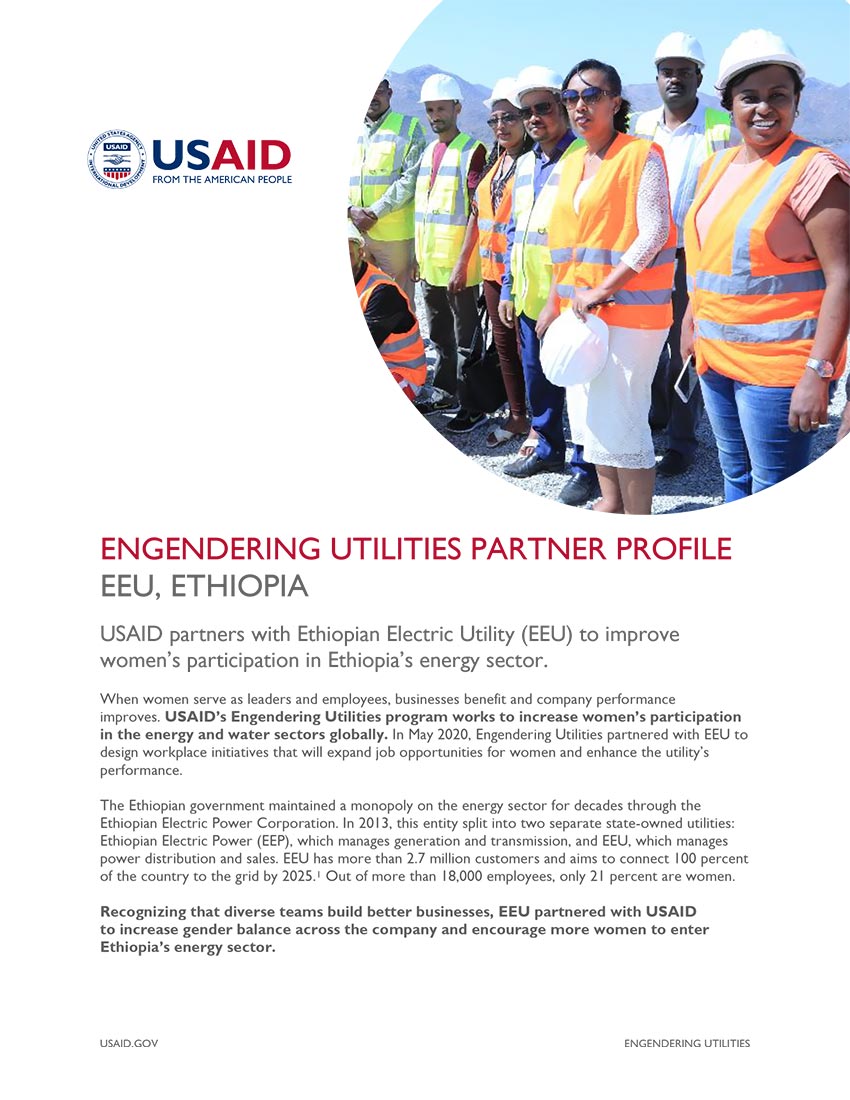- Energy Home
- How We Work
- Programs & Initiatives
- Smart Utilities
- Asia EDGE
- Auction Design Support to Colombia
- Energy Auctions for Kazakhstan’s Green Economy
- Energy Efficiency for Development
- Engendering Utilities
- About
- Business Case
- Approach
- Partners
- OSHEE, Albania
- SONABEL, Burkina Faso
- EDESUR, Dominican Republic
- DELSUR, El Salvador
- EEU, Ethiopia
- Energo-Pro, Georgia
- GRIDCo, Ghana
- BRPL, India
- TPDDL, India
- EDCO, Jordan
- IDECO, Jordan
- Miyahuna, Jordan
- KenGen, Kenya
- Kenya Power
- KOSTT, Kosovo
- LEC, Lesotho
- LEC, Liberia
- EGENCO, Malawi
- EDM, Mozambique
- EKEDC, Nigeria
- IBEDC, Nigeria
- ISWSC, Nigeria
- EVN, North Macedonia
- LASURECO, Philippines
- ZCWD, Philippines
- REG, Rwanda
- OFOR, Senegal
- Senelec, Senegal
- EVN, Vietnam
- Resources
- Stories
- Institutional Framework for Auctions in Mexico
- Powering Agriculture
- The USAID-NREL Partnership
- Scaling Up Renewable Energy
- EmPOWERing Women and Girls
- Competitive Energy Procurement
- Toolkits
- Monitoring & Evaluation
- Resources
- Stories
Speeches Shim
Engendering Utilities Partner Profile
EEU has more than 2.7 million customers and aims to connect 100 percent of the country to the grid by 2025. EEU employs over 18,000 people, of which 21 percent are women.
Rapid population growth in Ethiopia has strained government efforts to expand access to electricity, especially in rural regions. While the country’s grid covers 80 percent of the population, only 44 percent of urban and 31 percent of rural Ethiopians have access to electricity. The government adopted a National Electrification Program in 2017 with the goal of achieving universal access to electricity by 2025. They also signed a Public Private Partnership Proclamation that allows private firms to invest in the energy sector, creating a more competitive market. Engendering Utilities’ work with EEU will ensure women capitalize on increased investment in Ethiopia’s energy sector as the industry and labor force continue to grow.
A complex web of contributing factors prevents women in Ethiopia from joining the formal workforce, particularly the male-dominated energy sector. Ethiopia has made strides toward gender equality, most notably through the election of the country’s first female president, Sahle-Work Zewde, in the 2018 election. Despite this, only 35 percent of university students are women, with only seven percent of those women pursuing degrees in traditionally male-dominated areas. While female participation in the labor force is relatively high (76 percent), only 20 percent are employed in senior or middle management roles, and only five percent are top managers. Engendering Utilities is supporting EEU to consider and respond to factors that reduce women’s workforce participation by building inclusive policies and practices that benefit men, women, and businesses in the energy sector.
USAID is supporting EEU in its goal of advancing gender equality within the organization by providing change management coaching and leadership training, conducting a baseline assessment to identify gaps and opportunities for gender equality, and developing a strategic plan with EEU to facilitate the company’s gender equality goals.
USAID will also work to support and accelerate existing gender equality initiatives underway at EEU, including:
- Establishment of the Women, Children and Youth Affairs Directorate, which will report to the CEO’s Office and is staffed by a Director, Office Manager and three full time gender experts. The Directorate is charged with increasing women’s leadership and ensuring that the work environment at the utility is optimized to attract and retain female talent.
- Adoption of a Gender Mainstreaming Policy, which includes goals for increasing the number of women at the utility.
- Gender and Citizen Engagement Work Program, an expansive suite of measures including scholarships, mentorships, training, and policy changes. Under this Program, EEU has provided leadership skills training for its key female staff, adopted a sexual harassment policy, and is establishing childcare facilities in several offices.
- Establishing Quotas for Recruitment, so that all recruitment efforts include at least 50 percent women as candidates, enabling EEU to achieve a workforce that includes 30 percent women.


Comment
Make a general inquiry or suggest an improvement.